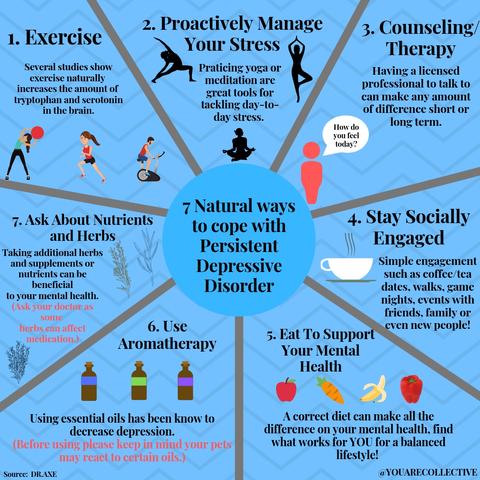
Persistent depressive disorder (dis-TPE-um), also known as dysthymic disorder (dlthym-DY-tis), is an ongoing long term (chronic) type of depression that affects about one out of every eight people of the same age bracket. You will lose interest in life, feel hopeless, have low energy, lack self-confidence, and have an overall negative feeling about yourself and life in general.
Although most depressive disorder is mild to moderate, you may have more severe symptoms. If you are depressed or feeling worthless, try to enlist the support of friends and family. It's very important that you find help before it's too late, so feel free to take a look at your options first before moving on to a self-medication option.
There are many treatments available for depression. These include prescription drugs such as antidepressants, monoamine oxidase inhibitors (MAOIs), and tricyclic antidepressants. You can also opt for psychotherapy, behavioral therapy, and hypnotherapy. You should also consider trying to fix the problem by talking to a family member or friend who has suffered from the problem before deciding which treatment to use.
Medications that are used to treat depression include selective serotonin reuptake inhibitors (SSRIs), monoamine oxidase inhibitors (MAOIs), and tricyclic antidepressants. Certain prescription drugs such as Zoloft (Prozac) and Celexa (Citalopram) are known to cause problems in the fetus and pregnant women. However, most psychiatrists believe that these drugs should only be used in cases of severe depression and when other treatments do not work. They should not be taken by pregnant women or children under 12 years of age, as this can lead to birth defects.
Antidepressant medications that are not used as a treatment for depression are non-steroidal anti-inflammatory drugs (NSAIDs), muscle relaxants and muscle relaxant sedatives. When used in conjunction with counseling, these drugs can greatly improve the quality of life of those suffering from depression.
A few more popular alternative forms of treatment are lifestyle changes such as healthy eating, exercise, meditation, massage, stress management and relaxation techniques and social support. The treatment you choose should depend on the particular case and your goals for treating this disorder. Psychotherapy has been shown to have a positive effect on patients with persistent depressive disorder.

Persistent depression is serious and should not be treated lightly. If you feel you are experiencing symptoms that are worrying you, don't hesitate to visit your doctor immediately.
The good news is, there are many treatments available. You should discuss your options with your doctor to help him decide what kind of treatment will best work for you.
When talking with your doctor, you need to remember that he is trying to help you get through the problem he is dealing with
He does not want you to feel bad. He may try to prescribe a drug to help you, but he doesn't want you to feel like you are alone because he is trying to help you.
If he suggests treatment, there are plenty of options for you to explore. You can try psychotherapy or medication, or a combination of both. or even an alternative type of treatment such as meditation or acupuncture. All of these options have positive results.
Even if you do not think you are ready to try any of these, it is important to speak to your doctor about your concerns. You may be able to discover new ways to help yourself with the disorder.
It is important to be open and honest with your doctor so that he can help you determine whether there is anything else that you need to do to help you cope with the disorder. This way, he can give you the advice you need that can help you overcome this problem.